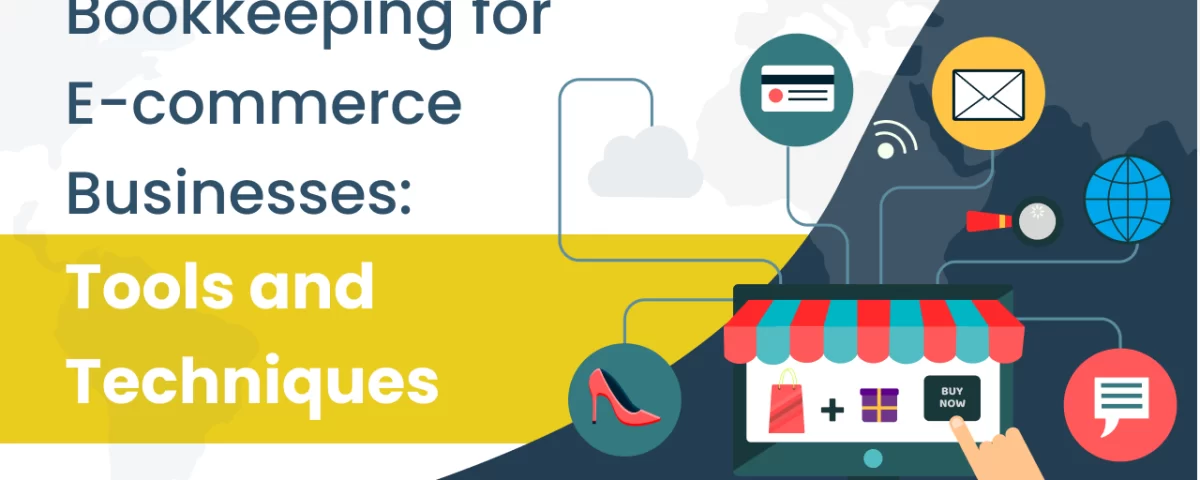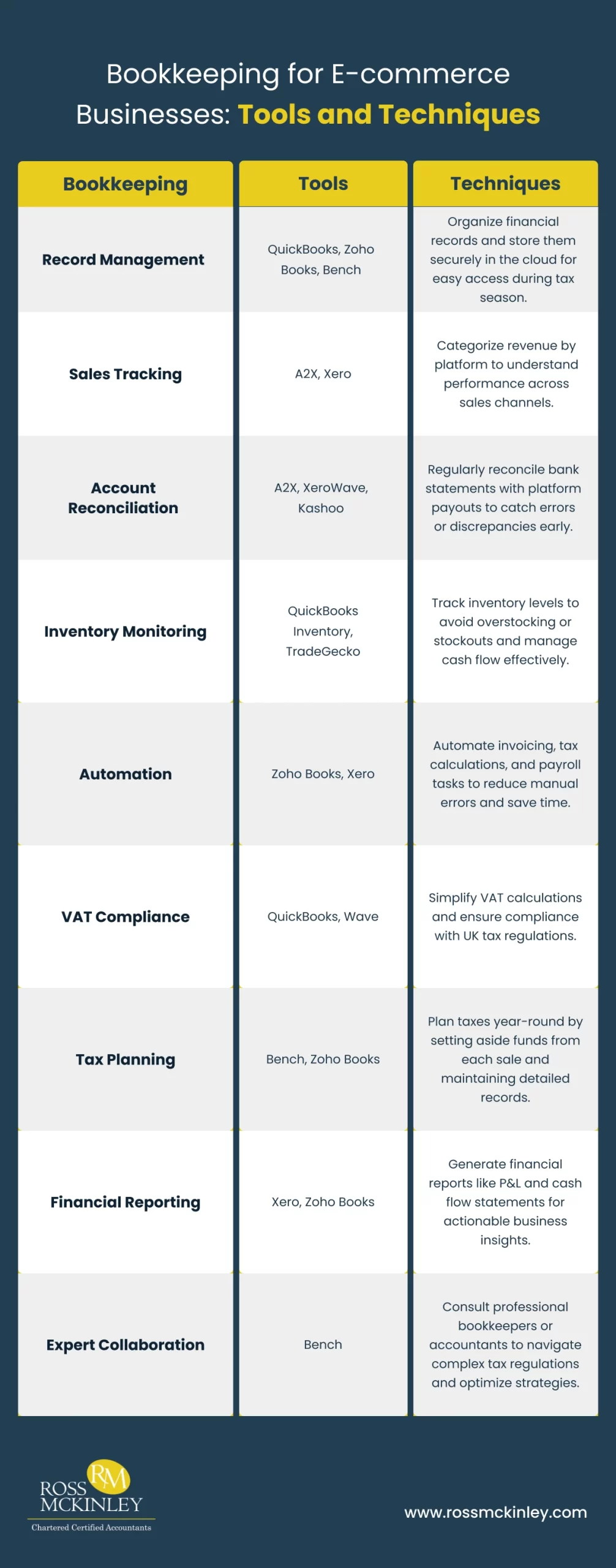
VAT on Staff Entertainment
February 7, 2025
The Role of Bookkeepers in Tax Preparation
February 12, 2025Bookkeeping for E-commerce Businesses: Tools and Techniques

Running an e-commerce business is exciting, but keeping your financial records in check can be daunting. Isn’t it? Bookkeeping, though sometimes overlooked, forms the backbone of a successful e-commerce operation.
It helps track expenses, ensure tax compliance, and provide insights into business performance. But what are the tools required or the techniques for efficient bookkeeping for an e-commerce business?
There is always an answer to every question, and we hope that by the end of this article, none of your questions remain unanswered. So, let’s explore the essential tools and techniques you need to manage e-commerce bookkeeping effectively, empowering you to focus on scaling your business.

Table of Contents
What is E-commerce Bookkeeping?
E-commerce bookkeeping involves the systematic recording, categorizing, and tracking of all financial transactions related to online business operations. This includes monitoring revenue from sales, managing expenses, calculating taxes, and reconciling accounts.
Proper bookkeeping ensures compliance with financial regulations, helps avoid cash flow issues, and provides accurate data for business decisions.
| Bookkeeping | Tools | Techniques |
|---|---|---|
| Record Management | QuickBooks, Zoho Books, Bench | Organize financial records and store them securely in the cloud for easy access during tax season. |
| Sales Tracking | A2X, Xero | Categorize revenue by platform to understand performance across sales channels. |
| Account Reconciliation | Wave, Kashoo | Regularly reconcile bank statements with platform payouts to catch errors or discrepancies early. |
| Inventory Monitoring | QuickBooks Inventory, TradeGecko | Track inventory levels to avoid overstocking or stockouts and manage cash flow effectively. |
| Automation | Zoho Books, Xero | Automate invoicing, tax calculations, and payroll tasks to reduce manual errors and save time. |
| VAT Compliance | QuickBooks, Wave | Simplify VAT calculations and ensure compliance with UK tax regulations. |
| Tax Planning | Bench, Zoho Books | Plan taxes year-round by setting aside funds from each sale and maintaining detailed records. |
| Financial Reporting | Xero, Zoho Books | Generate financial reports like P&L and cash flow statements for actionable business insights. |
| Expert Collaboration | Bench | Consult professional bookkeepers or accountants to navigate complex tax regulations and optimize strategies. |
Tools for E-commerce Bookkeeping
With the help of the right tools, You can transform your e-commerce bookkeeping from a chore into a streamlined, insightful process. These tools could be used by smaller as well as larger businesses according to their preferences. Here’s a deeper dive into some of the best tools available
1. QuickBooks
First and foremost: QuickBooks. This powerhouse tool is tailored for businesses of all sizes. QuickBooks automates expense tracking, generates financial reports, and integrates with platforms like Shopify and Amazon, simplifying revenue management. Its real-time tracking ensures you’re always updated on your finances.
2. Xero
Xero’s simplicity and robust features make it a favorite. Its seamless multi-currency support is perfect for international sellers, while bank reconciliation and inventory tracking features save hours of manual work.
3. Wave
Wave is a free yet feature-rich tool that offers invoicing, expense management, and report generation for small e-commerce businesses. It’s a cost-effective option that doesn’t skimp on functionality.
4. A2X
Using Amazon for your business? Well, A2X is a lifesaver for e-commerce sellers using platforms like Amazon and eBay. It automatically reconciles marketplace payouts with accounting records, eliminating guesswork and ensuring accuracy in your financial data.
5. Kashoo
Known for its simplicity, Kashoo is great for small operations. It auto-categorizes transactions, tracks receipts, and generates one-click tax reports, making compliance and financial planning a breeze.
6. Zoho Books
Zoho’s ecosystem of tools enhances its functionality. Zoho Books offers robust inventory management, automated workflows, and advanced reporting features. Its integration with e-commerce platforms ensures seamless financial tracking.
7. Bench
For businesses wanting professional expertise, Bench combines software and human bookkeepers. It handles everything from categorizing expenses to preparing monthly financial statements.
Techniques for E-commerce Bookkeeping
Effective bookkeeping techniques keep your records organized, ensure compliance with tax laws, and provide insights to help you make smarter business decisions.
Whether you’re a small business owner or scaling your e-commerce empire, mastering these techniques will save time, and reduce stress. As they allow you to focus on what you do best—selling.
1. Organize Your Records
Maintain clear, categorized records of every transaction. Use cloud storage solutions to store receipts, invoices, and financial statements securely, ensuring easy access during audits or tax season.
2. Track Revenue by Sales Channels
For e-commerce sellers operating on multiple platforms, categorizing revenue by channel provides insights into performance. Tools like A2X help ensure accurate revenue tracking from Amazon, Shopify, or eBay.
3. Regular Account Reconciliation
Reconcile your bank statements and platform payouts weekly or monthly. This ensures there are no discrepancies and helps catch fraud or errors early.
4. Monitor Inventory Levels
Inventory is a significant financial component of e-commerce. Use tools like QuickBooks Inventory or TradeGecko to prevent overstocking and stockouts, ensuring a healthy cash flow.
5. Separate Business and Personal Finances
Open a dedicated business account for all e-commerce-related transactions. This simple step simplifies tax preparation and ensures clean financial records.
6. Automate Recurring Tasks
Automate time-consuming tasks like invoicing, payroll, and tax calculations. Tools like Zoho Books and Xero reduce manual errors and save valuable time.
7. Focus on VAT Management
For UK-based sellers, staying compliant with VAT regulations is crucial. Choose software that simplifies VAT tracking, calculation, and filing, reducing compliance risks.
8. Plan for Taxes Throughout the Year
Don’t wait until tax season. Set aside funds for taxes from every sale and maintain detailed records to avoid last-minute chaos.
9. Utilize Financial Reporting
Generate and review financial reports like cash flow statements and profit-and-loss reports. These reports provide actionable insights into your business’s performance.
10. Collaborate with Experts
When in doubt, consult with professional bookkeepers or accountants. Their expertise can help you navigate complex tax regulations and optimize your financial strategies.
Why Us?
E-commerce bookkeeping is complex, but Ross McKinley Bookkeeping makes it seamless. We specialize in managing your unique financial needs with precision, from inventory tracking to handling multiple payment gateways. Our team ensures accurate records, tax compliance, and actionable insights so you can focus on growing your business.
Conclusion
Efficient bookkeeping is the backbone of a successful e-commerce business. By leveraging modern tools and adopting best practices, you can streamline your bookkeeping processes, maintain compliance, and focus on scaling your operations.
Whether you’re a small seller or an established brand, the right tools and techniques can make all the difference.
